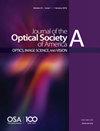Optical single-channel cryptosystem based on the non-negative matrix factorization and face biometric in cyan–magenta–yellow–black color space
引用次数: 0
Abstract
In this paper, an optical color single-channel asymmetric cryptosystem based on the non-negative matrix factorization (NMF) and a face biometric in cyan–magenta–yellow–black (CMYK) space is proposed. To the best of our knowledge, this is the first time that NMF has been introduced into optical color image encryption. In the proposed cryptosystem, the color image in CMYK space is first decomposed into four color channels: C, M, Y, and K. By performing NMF operations on the four color channels, the four basic and sparse matrices can be obtained, respectively, which achieves asymmetry and saves computational resources. The four basis matrices can be used as private keys, and the four coefficient matrices are synthesized by the inverse discrete wavelet transform for subsequent encryption. Finally, the synthesized image is encoded with double random phase encoding based on phase truncation (PT). Compared with the existing PT-based cryptosystems, our cryptosystem can improve security against a special attack. In addition, the chaotic random phase mask is generated by a face biometric, which is noncontact and unique. Numerical simulation results are shown to verify the feasibility and robustness of our cryptosystem. Further, the proposed cryptosystem can be extended to encrypt multiple images conveniently.基于非负矩阵分解和人脸生物识别的青色-品红-黄黑空间光单通道密码系统
提出了一种基于非负矩阵分解(NMF)的光学彩色单通道非对称密码系统和一种基于蓝-品红-黄-黑(CMYK)空间的人脸生物特征。据我们所知,这是NMF首次被引入光学彩色图像加密。在本文提出的密码系统中,首先将CMYK空间中的彩色图像分解为C、M、Y、k四个颜色通道,通过对四个颜色通道进行NMF运算,分别得到四个基本矩阵和稀疏矩阵,实现了不对称,节省了计算资源。4个基矩阵可用作私钥,4个系数矩阵通过离散小波逆变换合成,用于后续加密。最后,对合成图像进行基于相位截断(PT)的双随机相位编码。与现有的基于pt的密码系统相比,我们的密码系统可以提高对特殊攻击的安全性。此外,混沌随机相位掩模是由人脸生物特征产生的,具有非接触性和唯一性。数值仿真结果验证了该密码系统的可行性和鲁棒性。此外,所提出的密码系统可以方便地扩展到对多个图像进行加密。
本文章由计算机程序翻译,如有差异,请以英文原文为准。
求助全文
约1分钟内获得全文
求助全文
来源期刊
自引率
0.00%
发文量
0
期刊介绍:
OSA was published by The Optical Society from January 1917 to December 1983 before dividing into JOSA A: Optics and Image Science and JOSA B: Optical Physics in 1984.

 求助内容:
求助内容: 应助结果提醒方式:
应助结果提醒方式:


